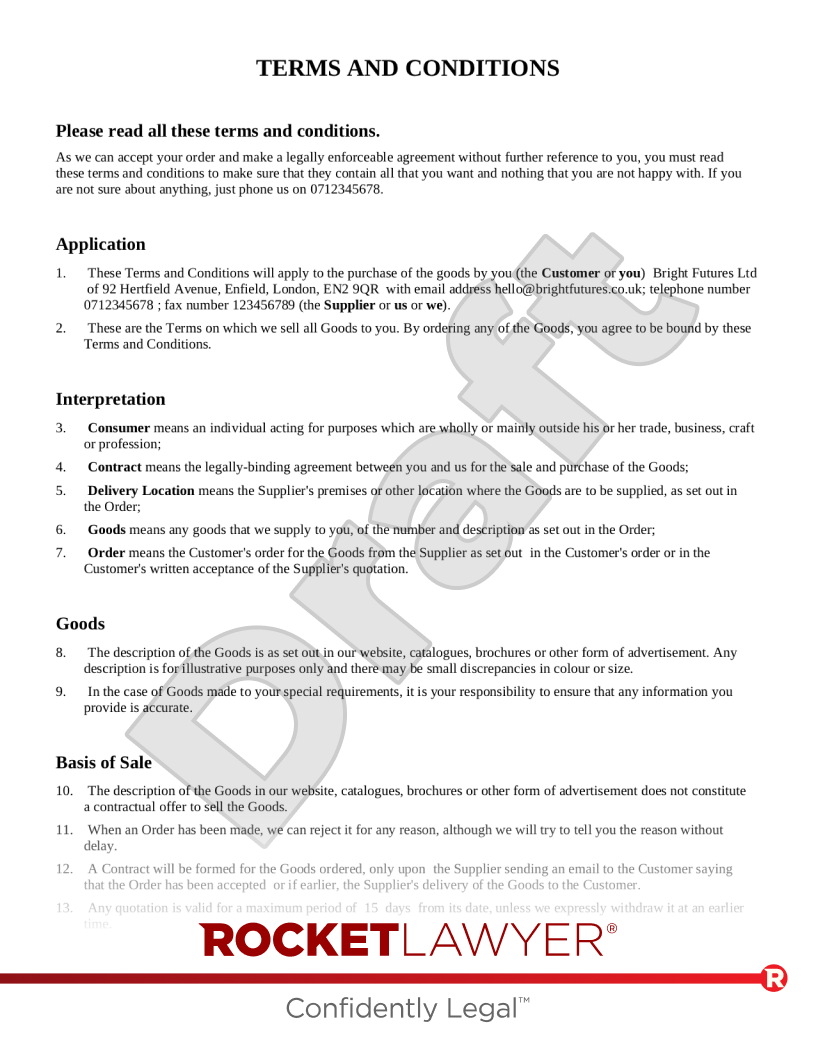What are terms and conditions?
To ensure that you don’t enter into unwanted agreements, you will need your own terms and conditions (also known as 'Ts and Cs', 'T&Cs' and 'T&C') of business. These may include terms and conditions for the sale of goods to businesses or consumers or terms and conditions for the supply of services to businesses or consumers. You can choose what you are selling and who you are selling to when creating your Terms and conditions.
Why use standard terms and conditions?
Using standard Ts and Cs will help to make everyone aware of their rights and obligations from the outset and allow the parties to focus their energy on agreeing on the specifics of a particular order. They also provide comfort that you are contracting on terms you can comply with and make it easier for your employees to conclude contracts. Read How to choose the right terms and conditions for more information.
What do they cover?
The standard terms will apply to every order or transaction you undertake. They should cover all the topics that apply to all your transactions, including:
-
how a contract is formed
-
payment terms
-
how delivery will take place
-
your policy on returns and refunds
-
your position on defective goods or services
-
your liability
The specifics of the transaction will be set out in an order and will include:
-
a description of the goods or services
-
the price
-
any other terms specific to the transaction
You must also provide an address for customers to contact you. As a sole trader, you will need to provide the address where the business is located or registered (which may be a home address). Sole traders who do not want to list their home address may use a business address, a mail forwarding service, or set up a PO Box.
However, if you are operating as a limited company, the rules are slightly different. A limited company can still use a PO Box as the correspondence address, but they must also provide a physical permanent address. This physical address can either be a home address, registered business address (ie the address registered at Companies House) or the address of the person managing the company’s corporation tax (eg the accountant).
Do standard terms have to apply to all orders?
You must make sure your standard terms apply to all orders.
For the terms to be legally binding and apply to your orders, you must bring them to the attention of your customers before an order is made. For example, you can do this by including or attaching them to any:
-
quotations
-
brochures
-
order confirmations
-
delivery notes
How to make sure your terms and conditions apply to online orders
If you are conducting business via a website, you will need to ensure customers agree to the terms before placing an order.
Terms should be available via a link on every page of your website.
Customers should ideally be presented with T&Cs which need to be accepted by scrolling through them and clicking on an 'accept' button before an order can be placed, preferably before payment details are taken. This maximises the possibility that the terms will be enforceable.
Alternative methods for getting customers to accept terms and conditions are:
-
dealing with this via a registration process
-
providing a link to the T&Cs before a purchase is made and requiring the customer to tick a checkbox that indicates acceptance
Any particularly onerous or unusual terms should be clearly highlighted.
Your Terms and conditions should inform customers how and when the contract is formed, as this will not generally be the time that a purchase is submitted.
Once the customer’s credit or debit card details have been verified, they can be directed to a page confirming that the order has been received and it’s good practice to also send out an email to this effect.
When you have checked that there are no problems with the order and that it can be fulfilled, an email confirmation of the acceptance of the order and dispatch of goods can be sent.
Selling to consumers using terms and conditions
When selling to consumers (ie private individuals), you must comply with consumer law when drafting your terms and conditions. For more information, read Doing business with consumers.
Ask a lawyer if you have any questions about making terms and conditions for your business.




